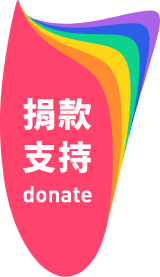Let’s go to the ILGA World Conference in South Africa! Joyce and Sebastian’s first experience with a grant assembly of global gender organizations
Date: 2024. 11/10-14
Location: Cape Town, South Africa
Goals:
- To exchange experiences with international LGBTIQ+ activists and to learn more about the current status of international advocacy work on gender diversity
- To help other participants learn more about the current status of the advocacy work on gender diversity and advocacy strategies in East Asia
Outcomes:
- Exchanging experiences with activists from other East Asian countries and contributing to more networking opportunities at ILGA Asia scheduled to take place in 2025.
- Building connections, to create opportunities for exchanges between the Global Equality Caucus (GEC) and Taiwan during GEC’s visit to Taiwan in 2025.
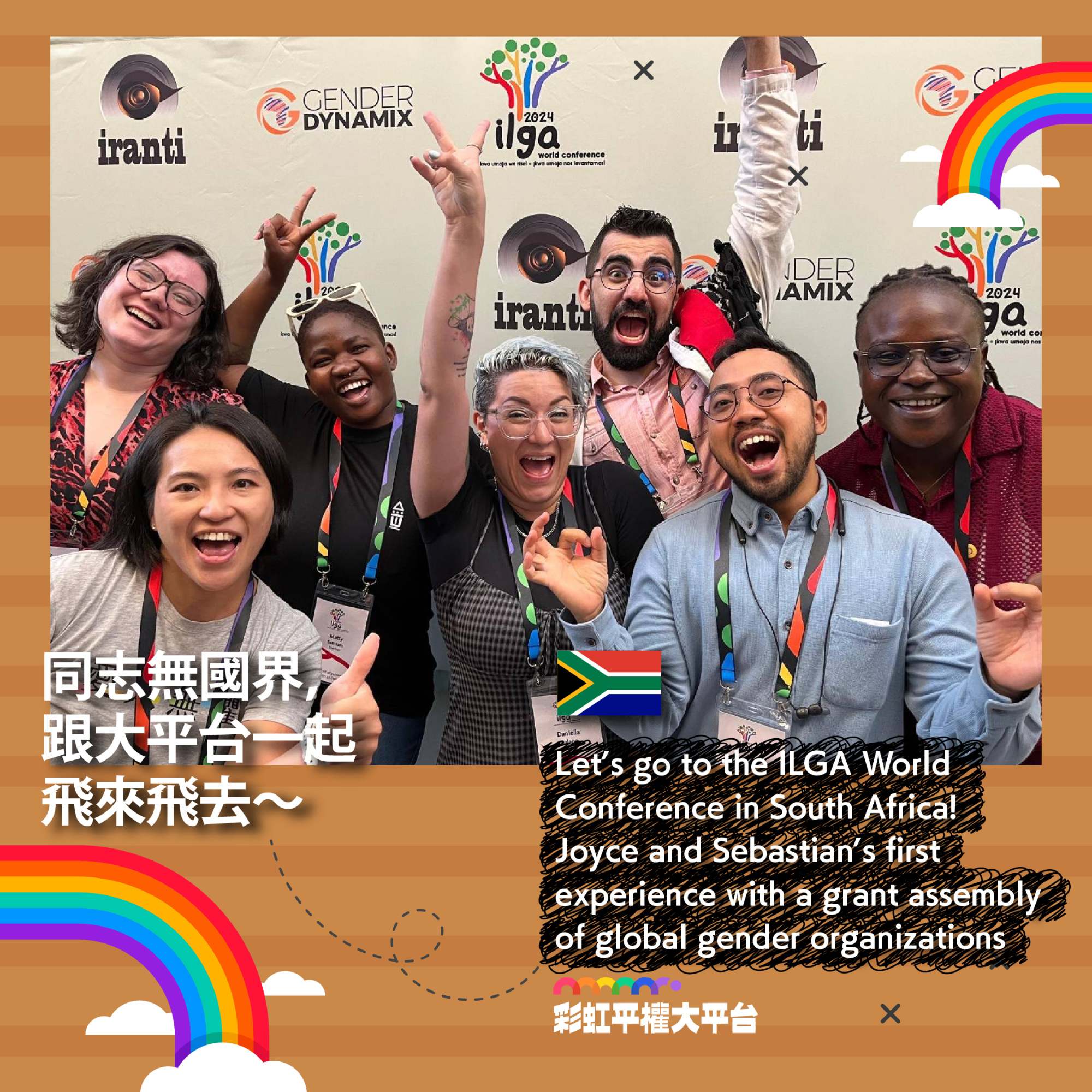
TEC’s executive director Joyce and deputy executive director Sebastian traveled to South Africa in early November 2024 to attend the ILGA World Conference and brought back with them many unforgettable memories from their visit. In this global assembly that gathered thousands of participants, what cultural shocks and amazing things did the two experience?
Background to the trip to South Africa
ILGA World (International Lesbian, Gay, Bisexual, Trans, and Intersex Association) was founded in 1978, its mission has been to fight for equal rights for diverse gender minorities. ILGA World consists of six regional branches: Pan Africa ILGA, ILGA Asia, ILGA Europe, ILGA LAC, ILGA NAC, and ILGA Oceania. The first ILGA World Conference happened in 1979 in Amsterdam, the Netherlands, and has since been held biannually in different regions and countries. The 31st ILGA World Conference in 2024 took place in Cape Town, the capital of South Africa, bringing together nearly 2,000 participants from 120 countries! This marks the first time in 25 years that the ILGA World Conference has returned to Africa.
It's Sebastian’s first ILGA World Conference, and he tells us excitedly: “I want to learn how the intersectionality of different issues is seen at this large-scale conference that focuses on discussing the living situation of LGBTIQ+ people all over the world and to exchange advocacy strategies with activists from other countries. Most importantly, I want to find out what LGBTIQ+-related issues the international society currently pays attention to.” At the conference, attendees from different countries gathered to discuss LGBTIQ+-related issues, to learn about each other’s difficulties, and to come up with improvement strategies to create a better environment so that diverse groups with minority gender identities could receive the rights they deserve. Being a LGBTIQ+ organization representing Taiwan, TEC has always wanted to engage in international discussions to help the voices from Asia be heard as well.
Joyce shares with us her perceptions and expectations of the ILGA World Conference: “This is also my first time, and I hope to learn about the LGBTIQ+-related issue the world cares most about right now and how they are being discussed. Also, is Asia being seen by activists from other countries? I also want to find out if the challenges faced by us in Taiwan at the moment regarding gender equality are a common experience in other countries as well. How do they overcome these challenges? Returning to Asia, I want to explore if Asian countries are having similar or different experiences. I hope that I can exchange ideas with other international partners as a member of the East Asian Alliance and come up with directions for the Alliance in the future.
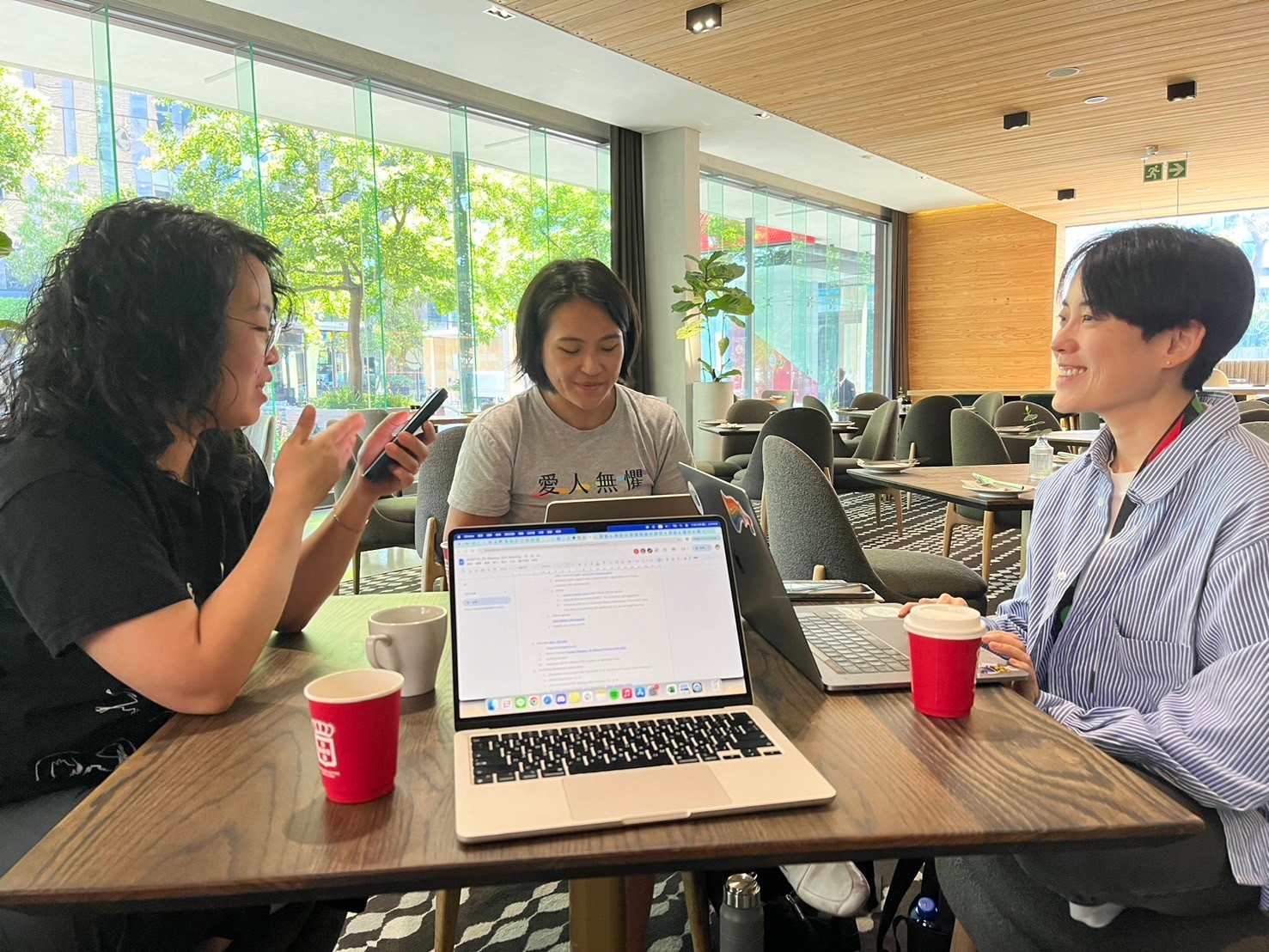
An overwhelming yet interesting atmosphere
Sebastian finds the ILGA World Conference quite different from other international conferences he attended in the past: “There are many attendees at the ILGA World Conference. Not only did the pilgrimage-like atmosphere make me a bit uneasy, but some panels or sessions ended early or were even canceled because of various force majeure factors, such as when the speakers missed their flight or other accidents. The conference itself felt organic to me like everything can happen anytime!”
While agreeing with Sebastian’s description of the pilgrimage-like atmosphere, Joyce adds her observations about the spatial arrangement: “There were indoor and outdoor spaces at the conference venue. The outdoor space was reserved for social networking,lunch, and snacks, and there were always people talking to each other. Meanwhile, the indoor space included rooms of different sizes. It felt like the elective courses at universities, as there was always a session going on in each room .”Joyce often chatted and exchanged ideas with activists from other countries in the outdoor space. She even arranged a formal meeting to help others learn more about the development of the East Asian Alliance.
Joyce feels that she’s learned a lot from this conference: “The goal I set for myself was to introduce the East Asian Alliance to activists from different regions. At the conference, I indeed managed to arrange meetings with UN experts and US organizations to talk about the Alliance. Also, I gave myself a small mission, which was to tell people on different occasions that I come from Taiwan and ask questions about Taiwan. For example, one panel was about data collection, which focused on how to collect information by using big data. I asked the speaker, if the data became public and transparent, could they be used by our opponents? I also shared the case of the data collected through the projects led by the Executive Yuan in Taiwan. As they would continue to be applied, we were worried that the data could be used by our opponents to target specific regions and age groups.” Although Joyce’s question was not answered on the panel, she not only showed Taiwan’s research achievements to the world but also raised an issue that activists from all countries might face.
Sebastian found it unfortunate that some of his goals could not be achieved: “The pre-conference, which I was very looking forward to, was canceled. It was the only agenda at the Conference that collaborated with businesses. It was a pity that I couldn't learn how businesses in other countries worked with NGOs. But other than that, I observed all kinds of intersectionalities at the conference, for example, how the UN system and data collection process advocate for the intersectionality between environment and gender. Furthermore, probably because the conference took place in Africa this time, many speakers were African activists, who were more capable of empathizing with the cultures and difficulties faced by different countries.” However, Sebastian also emphasizes that these advocacy strategies may not be suitable for Taiwan, because in some African countries, promoting issues related to LGBTIQ+ is punishable by criminal laws. The progress in the LGBTIQ+ movements in the two places is very different.
Challenges for the East Asian Alliance on International Platforms
Talking about the East Asian Alliance, Sebastian shared with us enthusiastically: “We officially introduced the East Asian Alliance to the international society at the ILGA World Conference this time, and received all kinds of feedback. Some found the idea interesting while others were curious about its future development, as at this stage, the goal of the East Asian Alliance is to produce research outcomes and its future projects are still under development.” Because of Taiwan’s unique position in the international society, our main advocacy strategy is either actively providing help and continuing to highlight the progress and achievements in the Taiwanese civil society, or emphasizing the difficult situation we face locally. However, Sebastian believes that we should develop a different angle. “If we see the international society as a large group of people and people in different regions all look different, I hope that the character of “East Asia” can be seen by the international society through its intersectionality. After all, we are a part of the international society, and we wish to move towards the same direction and goals as everyone else, and to reach a point of mutual understanding.”
Meanwhile, Joyce talks about the East Asian Alliance from the perspective of collaboration: “We split and share the work with our partners in the Alliance in the sense that we attend different conferences or sessions. We also make adjustments in accordance with every party’s condition. What has left a stronger impression on me was the experience of going with the partners from Japan and South Korea to discuss LGBTIQ+-related issues in East Asia with UN expert and other iNGOs, as well as exchanging ideas with organizations in other countries working on the political participation of LGBTIQ+ about how to expand our work in Asia.”
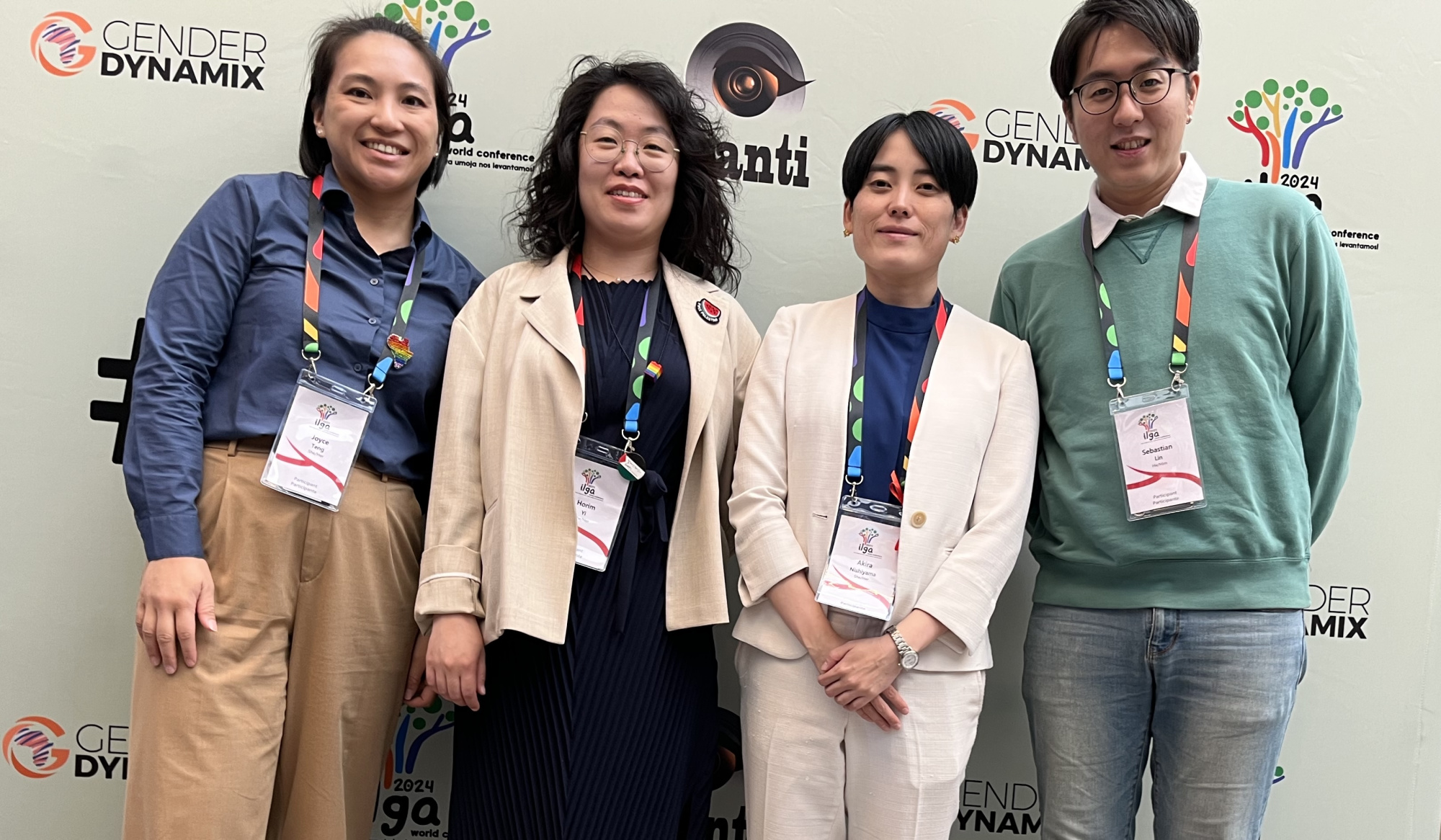
Unfortunately, activists from other countries demonstrated a limited understanding of the East Asian Alliance and tended to hold a fixed impression of individual countries. For example, they might have a great impression of Taiwan, while believing Japan and South Korea to be conservative without knowing the difficulties these three countries each faced. They only learned a bit more about each country’s situation after the exchanges. Joyce says in a tone with slight regret: “Our partners in the East Asian Alliance and I are all local activists, and we want to show our international partners the situation in Asia and to seek suggestions or collaboration opportunities from them. However, because of the lack of understanding of the current situation, it is hard for them to offer any actual assistance.”
The comprehensive impact of international affairs on gender issues
The ILGA World Conference took place shortly after the presidential election in the US, and therefore, many panels and side meetings talked about how the election result in the US might affect the international LGBTIQ+ movement. Joyce shares an example: “In Taiwan, some resources for gender equality advocacy come from US government agencies or private foundations, and Trump’s being elected may lead to the reduction of funding, and we would lose a friendly contact.” When local NGOs that provide services and carry out advocacy work have no funding and have to downsize, local LGBTIQ+ communities may be affected. She then talks about her worries and determination to face the unknown future: “I have to say, there is this unknownness in the current atmosphere. Although we experienced one term of Trump’s presidency already, we still can’t be sure what might happen next. It was also for this reason that we had this rare opportunity at the conference when activists from all countries discussed with each other what impact the US election could bring to the world, facing the unknown future and potential difficulties together. ”
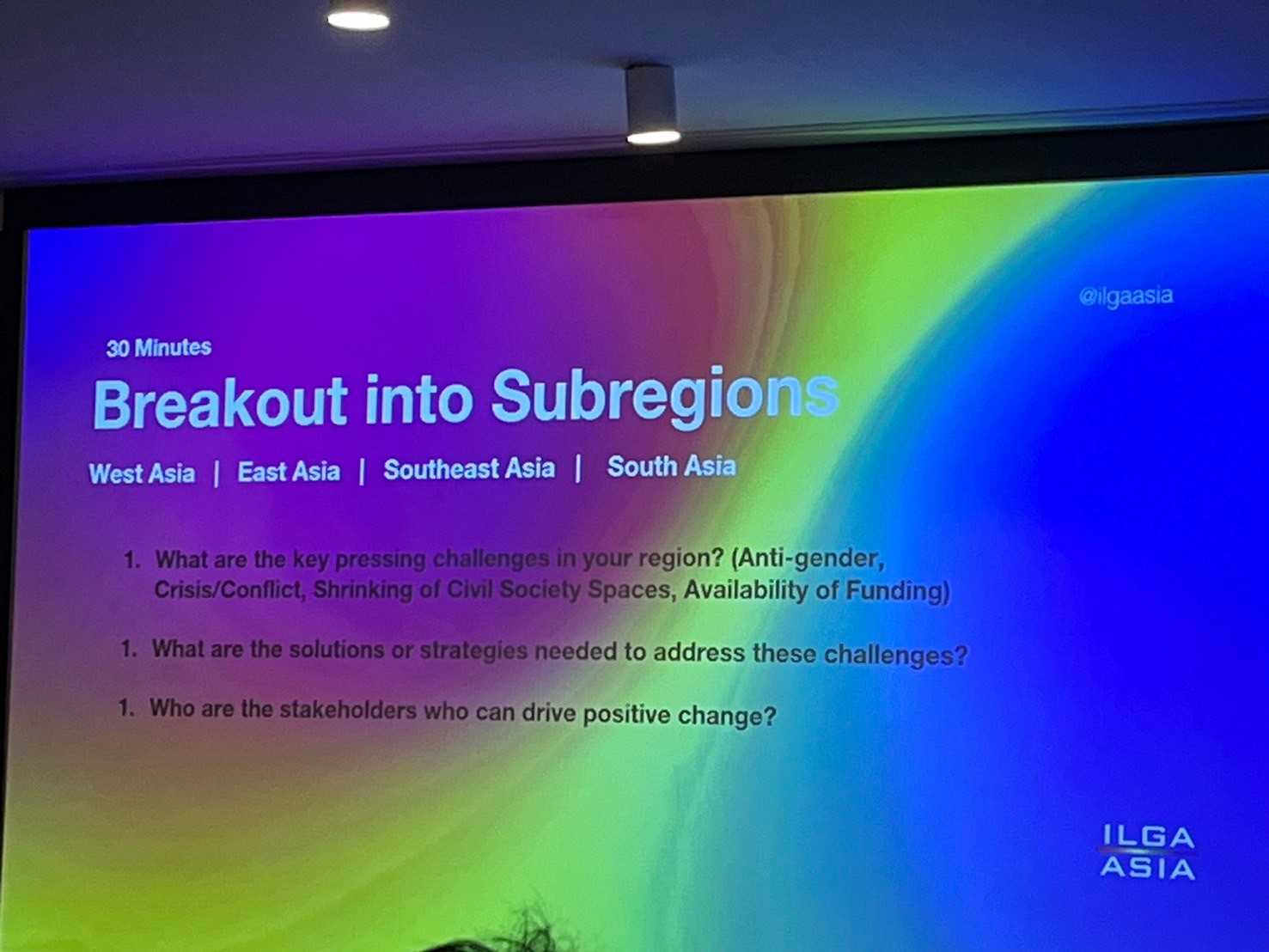
In addition to the US election, another incident triggered by international affairs occurred during the ceremony of the International Pride Awards. The Award is set up by ILGA World and UNDP jointly, with the aim to celebrate five outstanding LGBTIQ+ and allied activists around the world. For the ceremony, award recipients would make a short video to give their acceptance speech. One of the recipients was an activist from Russia, who was forced to leave Russia to continue his advocacy work on gender diversity after Russia defined gender issues as a type of extremism. At the event, another activist from Ukraine suddenly rushed onto the stage and shouted at the Russian activist and the audience, as well as accused the Award organizer of giving such an award to a Russian while the war between Russia and Ukraine was still ongoing, then left the venue in tears. Although having prepared an acceptance speech, the Russian activist found it inappropriate to give the talk after the incident. He said on the stage that he felt sorry how the war had hurt many people over the past couple of years, but it was not caused by him.
Sebastian still has very mixed feelings about this incident: “Probably because of my previous experiences with advocacy work, I care a lot about rehearsals and simulating different scenarios before an event takes place, to avoid potential conflicts and to respond quickly to different situations. Therefore, I was shocked when the Ukrainian activist rushed to the stage and found it slightly unfair to the Russian activist. Yet I could also emphasize the Ukrainian activist. After all, her country was at war. Thus, to me, it was difficult to judge. I consider the stance and response of the event organizer more important. However, the event organizer did not take any further measures or action. ”
Joyce adds her own observation and reflection: “As a Taiwanese, I can’t help imagining that if a Chinese activist is to receive the award, would I cheer for them? Then it occurred to me that advocating for gender issues in China is very hard, so I think I would still congratulate them. On the other hand, it may be because no war has actually taken place between China and Taiwan, and therefore, I can remain calm. As the war is still raging, I understand the pain experienced by the Ukrainian activist. As for the event organizer, it was only the next day that the board directors apologized on the stage for not being able to handle the conflict properly. I wish the event organizer could have done more both before and after the incident to prevent the potential harm caused to the parties involved.”
Follow-up actions after the ILGA World Conference
During the conference, East Asian activists from Japan, South Korea, Taiwan, Hong Kong, and Mongolia often chatted with each other, which accidentally resulted in a serious “East Asia Meeting” on the last day of the conference. While joking about how much “East Asians enjoy working,” Joyce and Sebastian also believe that this meeting enabled the East Asian Alliance to have a clearer idea of the future of the Alliance. In February 2025, ILGA Asia is scheduled to host its annual assembly, and TEC as well as our Japanese and South Korean partners will continue to introduce and promote the Alliance at different international meetings and occasions. Joyce tells us: “I feel very touched when thinking about how we’ve been able to build a long-term connection with the international society. For example, some foreign activists will come to Taiwan to attend another international conference, “RightsCon,” in February 2025, which will allow us to have more exchanges.”
Sebastian admits that the compact schedule of the conference made him slightly tired, but it’s worth it: “Seeing how the East Asian Alliance is slowly taking shape makes me realize that this Alliance has indeed been founded and is functioning. In addition, the fact that I attended the ILGA World Conference as a sexual minority from Taiwan was already a great chance for the international society to learn about the living situation of the LGBTIQ+ people in Taiwan. Strategies and actions need time to accumulate, and it is difficult to see immediate outcomes just after one conference. However, it can help us develop more future opportunities for collaboration.” Sebastian also believes that by attending the conference, he has become able to look at more issues and their intersectionalities, such as environmental protection, information security, gender, and the digital community. As an advocacy group, when we depart from the standpoint of Taiwan, what perspectives can we have?
In the past, East Asian countries did not have much networking with each other in terms of the LGBTIQ+ movement. For 2025, we look forward to positioning Taiwan into a larger context and network and re-enter the international society with a condition different from the past, to find our uniqueness, so that while recognizing the uniqueness of the East Asian region, we can also find our individual place. The international society is to face great changes in the following years, but TEC is ready for the challenges!
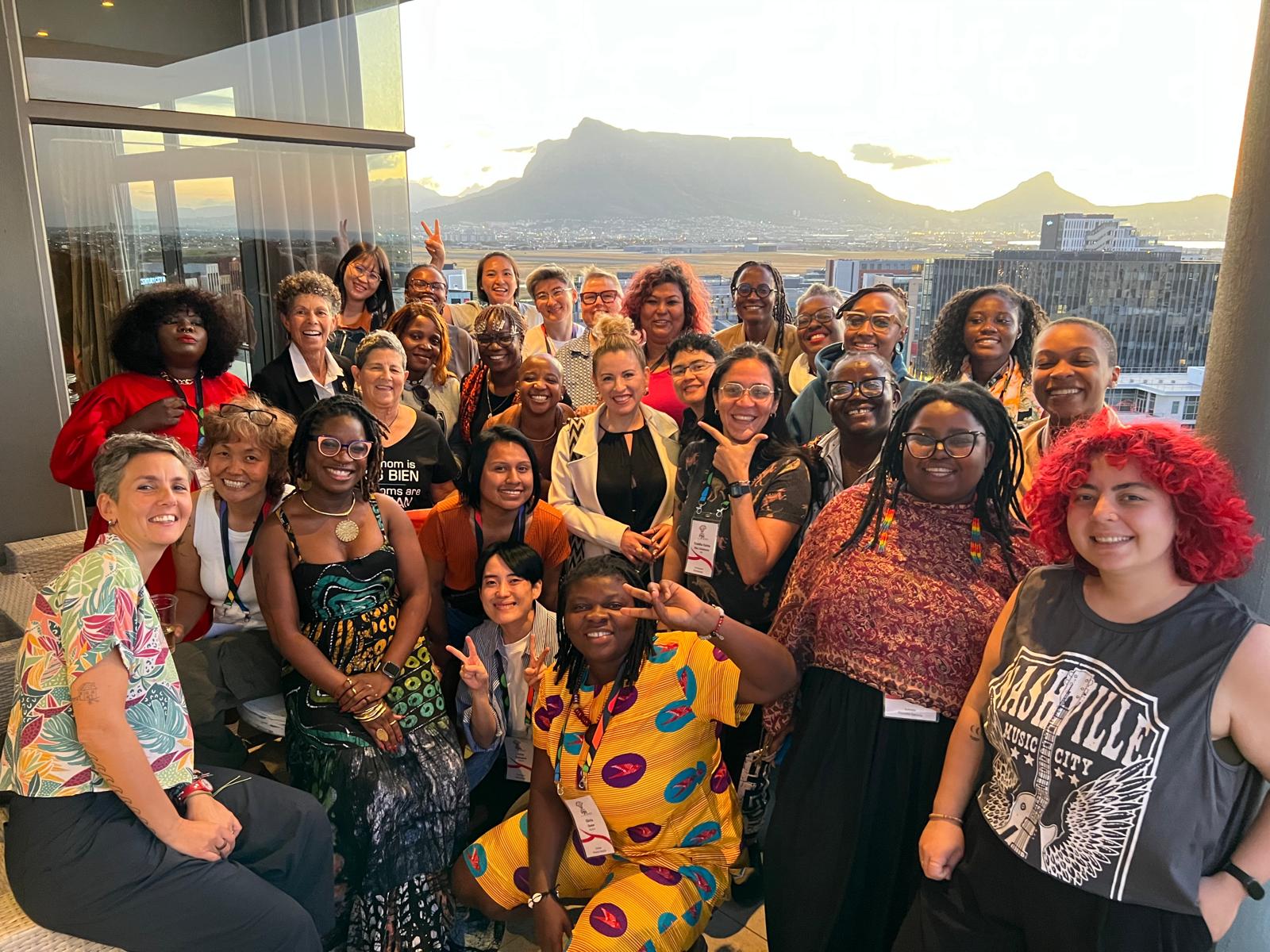
We invite all our followers to help us promote our international projects, pushing Asia towards gender equality.
🌍 Support TEC by making a donation, fostering an active “international society!”

